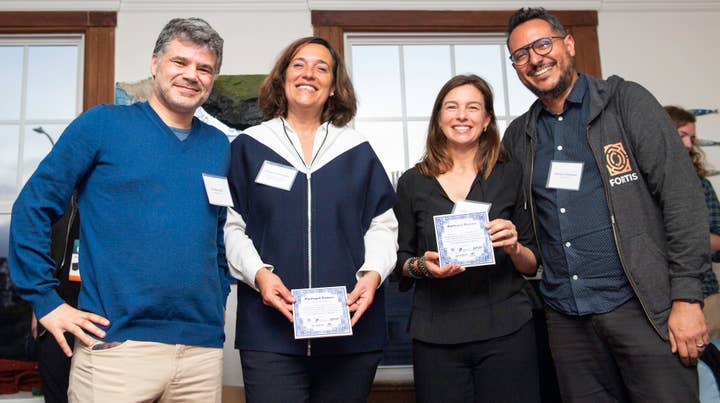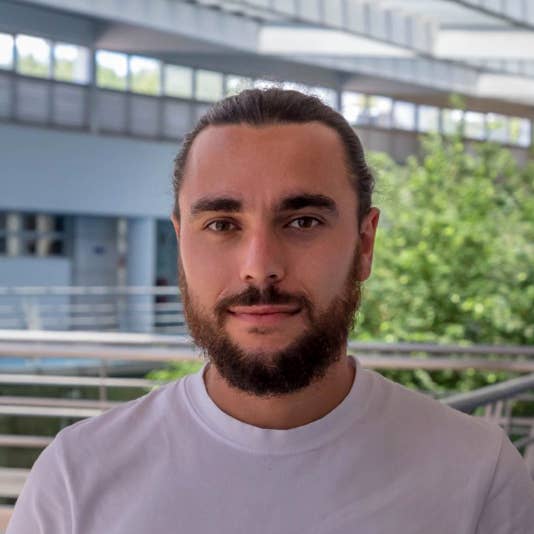Unlocking Portugal's game development industry
We talk to Portuguese Game Developer Association executive director Diogo Rato about its booming industry, the opening of the Gaming Hub in Lisbon, and what's ahead

The Portuguese games industry had a big presence at GDC last month, with over 50 delegates from 20 companies attending, 14 companies represented in the country's pavilion (its first ever at the event), and a reception organised at the Consulate General of Portugal welcoming over 100 attendees.
This reflects Portugal's upwards trajectory over the past few years, as also evidenced by the opening of a games-specific co-working space in Lisbon a few months back. The Gaming Hub aims at becoming a "focal point for innovation, collaboration, and growth within the gaming industry in Portugal and beyond," executive director of the Portuguese Game Developer Association (APVP) Diogo Rato said at the time.
In an interview with GamesIndustry.biz, Rato tells us more about the impressive trajectory of the industry in the country.
"The official public data shows that since 2010, the number of studios in Portugal has been increasing year-over-year by more than 20%, and [at] a rate of 33% since 2018," he says. "Impressively, the revenue generated has observed an even bigger CAGR: since 2010 a CAGR of 41% and since 2018 a CAGR of about 63%. The official turnover was over €38 million in 2022 – the most recent data available. Since 2018, the number of people working in the game industry has grown by approximately 53% each year."
Portugal started making its mark in games over the last decade, Rato continues, but he points out its roots in indie development dating from the '80s.
"One remarkable example is Elifoot – one of the first football management games – developed for ZX Spectrum," he points out. "[But] only after 2005 it is possible to observe new games being released every year, such as Toy Shop Tycoon from Seed Studios, or Hysteria Hospital: Emergency Ward by Camel Entertainment."
Miniclip establishing itself in the country in 2010 ahead of 8 Ball Pool's hit release had a lasting impact on the Portuguese games industry. An increased number of professional developers established themselves in the country in the first half of the 2010s, Rato explains, contributing to games including Seed Studios' Under Siege, MotoGP 13 (by Bigmoon Entertainment then, now called Saber Interactive Porto), and Quest of Dungeons by Upfall Studios.
And since 2018, Portugal has experienced "unprecedented growth and innovation" in games, Rato continues, pointing to game releases, studio acquisitions and creations, and workforce expansion across existing companies.
"Since 2018, the number of people working in the game industry [in Portugal] has grown by approximately 53% each year"
For instance, in 2018, Doppio (recently acquired by Fortis Games) started developing voice-activated and narrative games (and soon got investment from the likes of Amazon and Google). AR-focused studio OnTop also opened its doors that year.
In early 2019, Funcom acquired Lisbon-based studio ZPX, with which it had previously collaborated on Conan Exiles. In October 2019, Saber Interactive acquired Bigmoon.
In 2022, Miniclip moved to a new office with a team of 350 employees, making it its largest operation among 17 global locations.
"Around this time, with an increasingly larger number of studios, the APVP was founded to contribute to the proper and sustainable development of the local game industry," Rato adds.
Kwalee also opened a global office in Almada in 2022 and, on the services side, Testronic opened a studio in Lisbon. Rato is keen to highlight that the Portuguese games industry is also made out of game tools providers such as Didimo, Anybrain, or Sound Particles, showing its diversity.
"Although not yet as established as our European counterparts, the Portuguese industry has grown impressively in the last few years while still being quite heterogeneous," he says. "One of the factors that might have contributed to the escalating number of companies is the fact that Portugal has slowly been establishing itself as an important tech hub for startups in Europe."
He also notes other contributing factors, including the country's quality of life, its high English proficiency, and the quality and number of its engineering graduates. All of these aspects offer "a strong foundation to attract talent and establish new game studios in Portugal," Rato continues, pointing to Kearney's latest Foreign Direct Investment Confidence Index, ranking Portugal at No.14 globally.
Portugal also offers an "entry point" to the European market for other Portuguese-speaking countries, which Rato says represents around 260 million people, and vice versa. He notes the country's close relationship with Brazil for instance, a market that is currently booming.

"In engineering, Portugal had more than 17,000 graduates in 2022," he continues. "Although Portuguese companies are no exception to the global scarcity of senior game developers, we have observed many world-class C-levels, top management staff and seniors moving to Portugal and working remotely. Increasing the proximity with the local community has been a goal of APVP towards transferring the knowledge of seasoned veterans to early-stage game studios and game developers."
The shortage of senior-level professionals is one of many challenges APVP is looking to tackle, with Rato saying that the country's lack of senior product and business experience "requires attention." Challenges also include limited government support.
The Portuguese government offers some support, including grants and subsidies for companies looking to hire young graduates looking for permanent employment (which can represent a "considerable expense" for new studios, Rato points out), as well as a tax credit that can go up to 80% for R&D expenses.
"Nonetheless, game developers in Portugal do not yet have public fiscal or financial incentives specifically tailored to support game development productions like, for instance, some other European [Union] state members," Rato says. "To support a growing industry, already established companies need to be able to attract senior talent, and tax credits can enable the Portuguese producers to offer competitive salaries. APVP is engaged with the local administration to explore the implementation of such incentives."
He adds: "Additionally, the industry grapples with typical challenges present in many European sectors, including taxation. [But] with the industry expanding and collective efforts tackling these issues, we anticipate that these hurdles will be overcome. Different courses in education are available, covering game production, game AI, digital art, game programming, sound, and multimedia, that can provide a well-rounded education. However, we see an opportunity for improvement by enhancing the practical aspects of these courses, ensuring they effectively prepare students to enter the industry.
"APVP is an example of collaboration by multiple game studios that want to create an even better environment for game developers. Since we started our activities almost two years ago, we have identified the strengths and weaknesses of our ecosystem as well as provided policymakers the necessary evidence and contributions to create increasingly better conditions for companies to come to Portugal. We [also] aim to produce more professionals in the field while also enticing back those who have left our country."

The opening of the Gaming Hub in Lisbon is looking to tackle some facets of these challenges, with the structure hosting several gatherings since its opening.
"The Gaming Hub is the first of its kind in Portugal and focuses on the ability of startups and studios to scale and create synergies between all the mentors, investors, and other companies in the sector. The new space includes 12 private rooms and 12 coworking spaces divided into two floors, with Fortis Games as the anchor, occupying one of the floors entirely, game studios such as OnTop Studios, Phat Fingers, The Gang, [and] game tech providers like Didimo and venture capitals focused on gaming."
Rato continues: "The hub is not just a physical space; it's a catalyst for growth, bringing together talented game developers, fostering collaboration, and creating opportunities for the gaming community to thrive. Having witnessed the dynamic energy of Lisbon's game development scene, it's clear that this hub is the right mix of talent and experience needed to unlock the city and, ultimately, Portugal's entire game development industry."
Looking ahead, Portugal's rich culture represents "exciting prospects" for games in the country, Rato enthuses, again emphasising how game development education at universities will lead to a "fresh wave of skilled young talent."
In 2023, Pole To Win announced its plan to open an office in Braga and create 60 jobs by 2024, and GlobalStep is set to open a new location in Portugal this year.
"This hub is the right mix of talent and experience needed to unlock the city and, ultimately, Portugal's entire development industry"
"With the increasing number of companies contributing to the ecosystem, more businesses are expected to set up studios and establish new headquarters in our country," Rato adds. "Beyond market growth, there is a general interest within the community in encouraging this expansion. Efforts made by APVP in close collaboration with other entities to organise and host B2B events highlight how vibrant and lively the community is."
He points to DevGAMM in Lisbon, Gamiberica's first edition in Porto, and Websummit's gaming side event hosted by Mobidictum – all of which took place last year. Devcom's Leadership Summit also took place in Portugal for the first time last February.
"All these initiatives provide a platform where industry professionals can share ideas on global challenges, fostering collaboration and knowledge exchange. Additionally, the regular meetups in Lisbon (Game Break) and Porto (Game Dev Meet) further contribute to creating a thriving environment for the industry to grow."
He concludes: "Over the years, we have witnessed significant market growth in Portugal's video game industry. From 2018, where the total turnover stood at €5.5 million, to 2022, where it surged to close to €39 million, the substantial growth underscores the industry's resilience and Portugal's dedicated efforts to expand in the video game sector."
Sign up for the GI Daily here to get the biggest news straight to your inbox
